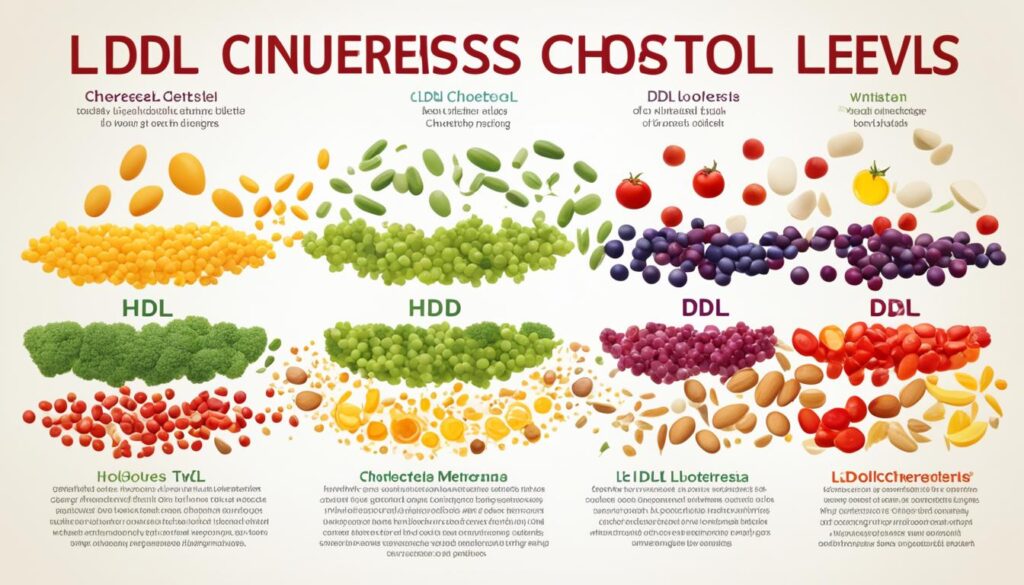I’m very interested in the Mediterranean diet and its benefits. Recent research from Lausanne University in Switzerland is making me think. Can this diet really reduce cholesterol like we’ve heard?
The Mediterranean diet is famous for lots of plant foods, good fats, and a bit of seafood and red wine. Studies show it can lower bad cholesterol and help the heart. But, new research from Switzerland is questioning this. Now, I want to know the true effect on cholesterol levels.
The Mediterranean Diet: A Heart-Healthy Eating Pattern
The Mediterranean diet is well-known for keeping hearts healthy. It’s based on how people in countries near the Mediterranean Sea eat. This diet focuses on lots of plants, good fats, and some seafood and poultry.
Plant-Based Foods at the Core
Plant-based foods like vegetables and fruits are key to this diet. Whole grains, legumes, nuts, and seeds are also included. These foods help you stay healthy by giving you fiber, vitamins, and minerals.
Healthy Fats from Olive Oil and Nuts
The Mediterranean diet loves healthy fats from olive oil and nuts. Olive oil is full of good fats that lower bad cholesterol and increase good. Nuts, like almonds, walnuts, and pistachios, are also great for your heart.
Moderate Intake of Fish and Seafood
This diet suggests eating fish and seafood in moderation. They’re packed with omega-3s, which help your heart and fight inflammation.

Following the Mediterranean diet means you’re eating in a heart-healthy way. It’s not just good for you; it’s tasty too. This diet is all about making good, lasting choices that boost your health and happiness.
Key Benefits of the Mediterranean Diet
The Mediterranean diet makes cholesterol levels better. It’s good for your heart. You eat a lot of plant-based foods, good fats, and some fish. This helps keep your cholesterol in check.
Lowers LDL “Bad” Cholesterol
Eating healthy fats from olive oil and nuts is key. It lowers LDL, the “bad” cholesterol. Plus, it cuts the risk of heart problems. The Mediterranean diet swaps bad fats for good ones, improving your heart health.
Increases HDL “Good” Cholesterol
It’s not just about lowering LDL. The diet also boosts your HDL, or “good,” cholesterol. A high HDL is great for your heart because it removes bad cholesterol. Eating lots of plants, good fats, and having some red wine helps your HDL.

Following the Mediterranean diet helps balance your cholesterol. It lowers your LDL and raises your HDL. This leads to a healthier heart and less risk of heart problems. So, it’s really good at improving how your heart works.
Can the Mediterranean Diet Lower Cholesterol?
The Mediterranean diet is seen as a good plan for the heart. But, new studies say it might not lower cholesterol as much as we think.
One study from the Journal of the American College of Cardiology looked at this. It did not see a big change in cholesterol or triglyceride levels. This study was from Lausanne University, Switzerland. They found the diet was good for “good” cholesterol and triglycerides for some. But, it did not show big changes for “bad” cholesterol.
More research is needed on how the Mediterranean diet affects cholesterol. Even if it might not lower cholesterol much, this diet is still very good for the heart. It encourages lots of plant foods, good fats, and some fish. This can make the heart work better and lower chances of heart problems.
Remember, using the Mediterranean diet can still benefit your health. It focuses on foods good for the heart. Even if it does not lower cholesterol much, it surely helps overall heart health.
Key Takeaways:
- Recent research suggests the Mediterranean diet may not have as significant an impact on cholesterol levels as previously believed.
- The diet was positively associated with higher HDL “good” cholesterol and lower triglyceride levels in those without diagnosed dyslipidemia.
- However, there were no significant associations reported for total and LDL “bad” cholesterol.
- More long-term research is needed to fully understand the Mediterranean diet’s effects on cholesterol management across different populations.
- The Mediterranean diet’s emphasis on heart-healthy foods can still provide numerous cardiovascular benefits, even if its impact on cholesterol is not as profound.
Factors Affecting Cholesterol Levels
Keeping cholesterol levels in check is vital for a healthy heart. Your genes and way of living both play a big part. We’ll look at how these can change your cholesterol.
Genetics and Family History
Genetics are key in setting your cholesterol levels. If high cholesterol or heart disease runs in your family, you might face similar risks. How your body handles cholesterol is partly decided by your genes. This might raise your LDL or lower your HDL.
Physical Activity and Weight Management
What you choose to do daily, like how much you move and eat, really matters for cholesterol. Regular movement can up the good cholesterol while lowering the bad kind. Being at a good weight plays a part too. Too much weight and not moving enough harms your heart by messing up cholesterol.
To keep your heart healthy, you need to think about both genes and lifestyle. Knowing what affects your cholesterol helps you stay on top of it. This way, you can keep a good and healthy cholesterol level.
Incorporating the Mediterranean Diet into Your Lifestyle
Moving to a mediterranean diet implementation is fun and good for your heart. You should eat more plant foods like fruits, veggies, grains, and beans. Also, use healthy fats from olive oil, nuts, and fish.
To follow the Mediterranean diet, cut back on red meat, carbs, and sugars. These foods can bad for your heart. Changing your diet slowly but steadily is the key. This way, you get to enjoy the diet’s health perks long-term.
- Focus on plant-based foods like fruits, vegetables, whole grains, and legumes
- Incorporate healthy fats from olive oil, nuts, and fatty fish
- Limit red and processed meats, as well as refined carbohydrates and added sugars
- Make gradual, sustainable changes to your diet and lifestyle
Don’t forget, the mediterranean diet implementation is a lifestyle choice. It’s more than food; it’s an approach for a healthy heart. Living by the Mediterranean diet supports your heart and overall well-being.
Long-Term Adherence for Maximum Benefits
A mediterranean diet works best when you stick with it for a long time. Studies show it’s not the short-term benefits but lasting changes that help your heart. This lifestyle leads to better cholesterol, lower heart disease risk, and a healthier life.
Eating like the mediterranean way, with lots of plants and good fats, is a choice for life. It’s not a quick fix. This approach helps you manage cholesterol and stay healthy over time.
Being steady with the mediterranean diet really helps your heart. People who keep it up see great cholesterol improvements. It’s the long haul that truly boosts your heart’s health.
Turning the mediterranean diet into a life-long habit is the goal. It’s about adding the diet’s main ideas into your everyday life. This sustainable approach is not only good for you but also enjoyable.
Dietary Approaches for Cholesterol Management
Along with the Mediterranean diet, other food tactics can manage my cholesterol. The DASH diet is great for this. It leads me to eat fruits, veggies, whole grains, and lean meats. It has proven to lower my bad cholesterol. The TLC diet also helps. It aims to cut down on bad fats and cholesterol. Going vegan or vegetarian helps too. Eating lots of plants and fiber can make a positive change in my cholesterol.
When tackling cholesterol, what works best is what’s fit for me.
The Mediterranean, DASH, or TLC diets can be changed to suit my needs. They aid in sticking to a heart-healthy diet. This, in turn, keeps my cholesterol in check.
The real win is in finding a diet I can do over a long time. Sticking to the Med diet or any healthy eating way is good. Also, adding in regular exercise is a double bonus. With smart food picks and moving more, I keep my cholesterol and heart health on track.
